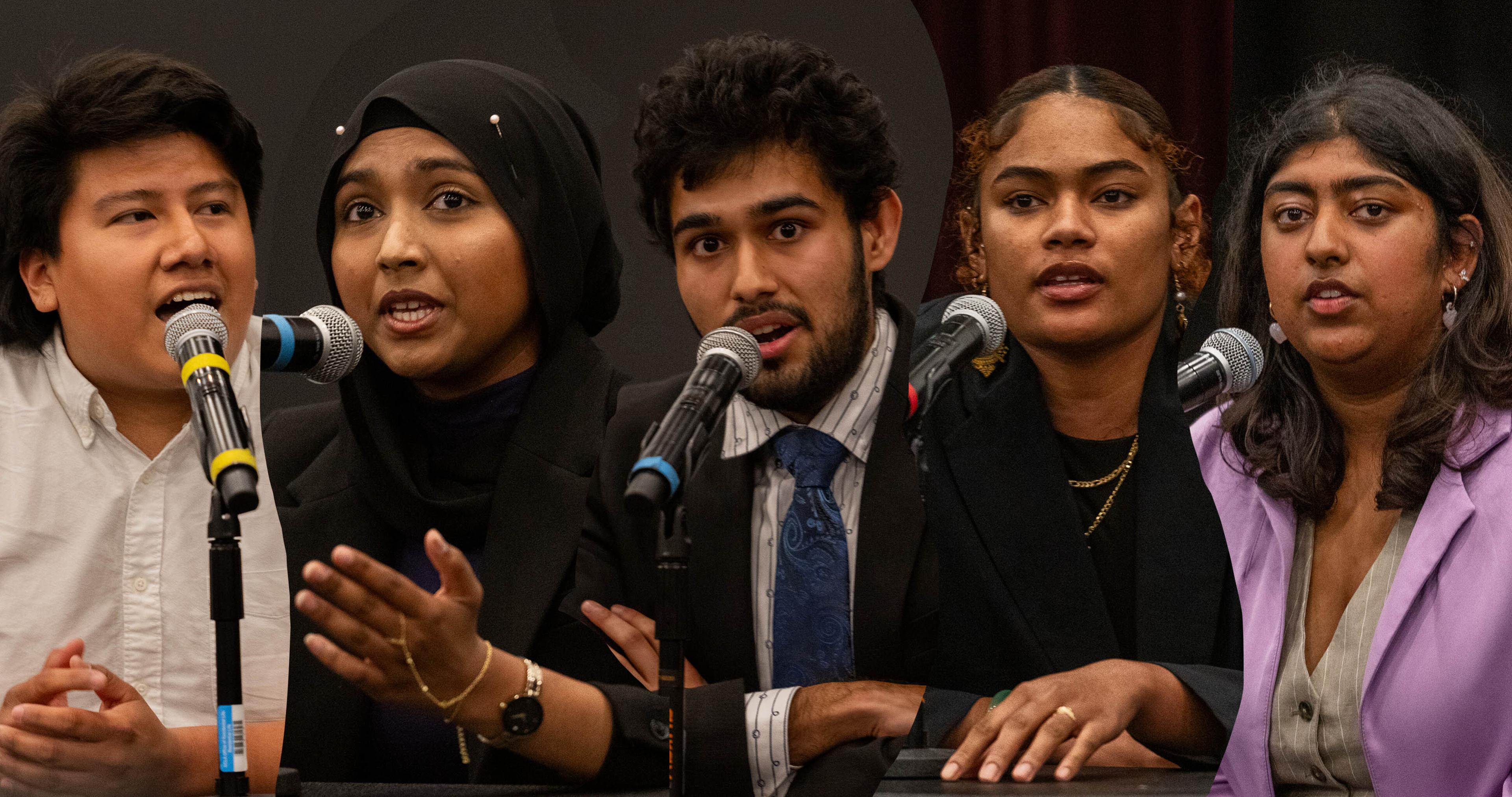USAC 2025-2026 candidate debates: President
Diego Emilio Bollo, Mafruha Esha, Syed Tamim Ahmad, Jiorden King and Teesha Sreeram speak at a debate. Five candidates running for Undergraduate Students Association Council president attended an election debate Thursday. (Left to right: Zimo Li/Photo editor. Photo illustration by Zimo Li/Photo editor)
By Caitlin Brockenbrow
May 1, 2025 10:31 p.m.
This post was updated May 4 at 9:20 p.m.
Five candidates running for Undergraduate Students Association Council president debated their approaches to advocacy and inclusivity Thursday.
The USA Elections Board and the Daily Bruin co-hosted a series of debates between candidates in the upcoming USAC election. Five candidates are running for the position of president.
Christina Morcus, a third-year cognitive science and international development studies student who would have been the sixth candidate, was disqualified April 24 for failing to submit required funding disclosures.
Diego Emilio Bollo, a third-year labor studies and political science student and a current general representative on the council, said he will support and advocate for the diverse needs of UCLA’s student body. He added that he will prioritize decreasing policing on campus and that he campaigned for it while serving as general representative.
“I’ve worked with the diversities of our students but most importantly in our leadership,” Bollo said. “Especially in the Office of the President, we need to understand that USAC could be used and needs to be used as a channel for social change.”
Bollo said the council should not necessarily trust UCLA administrators. He added that, as president, he would ensure that UCLA commits to its promises to protect diversity and become a Hispanic-Serving Institution.
Jiorden King, a third-year psychology student, said she believes it is important to hold UCLA administrators accountable. She added that she wants to ensure that every student’s voice is heard and proposed that USAC should hold town hall meetings.
“I also plan to highlight, expand and also acknowledge all the basic needs resources on campus,” King said.
King said she thinks USAC officers’ pay should be reduced and that all of the council’s spending should be made public. King added that she would try to build trust with the UCLA administration, evaluate the hiring process for administrators and bring back “true Bruin values.”
Mafruha Esha, a second-year biochemistry and mathematics student, said she believes UCLA should live up to being labeled the nation’s No. 1 public university.
“As president, you need to be someone who is good at leading these committees to uplift our communities that are able to thrive under our leadership,” Esha said.
Esha added that she also plans to cut USAC officers’ stipends. She said she sees USAC officers as the voice of the student body.
However, Bollo and Syed Tamim Ahmad, the two candidates who currently hold USAC office, said they opposed cuts to USAC officer stipends, adding that they would reduce people’s ability to join the council.
Ahmad, a third-year physiological science student, said he wants to represent students who do not feel they belong on campus. Ahmad, the current international student representative, added that his top two priorities are to advocate for basic needs access and campus inclusivity.
“Many of the buildings here at UCLA are ADA (Americans with Disabilities Act) non-compliant,” Ahmad said. “We need to make sure that there is a campus that is an inclusive campus, and to do that, we will be establishing a campus accessibility audit.”
Ahmad said he believes every student matters, adding that he often felt that he did not belong at UCLA as an international student. He said he would implement plans to make sure every student feels seen on campus.
Teesha Sreeram, a third-year international development studies student, said she wants to focus on creating a safe and accessible campus. They added that they hope to hold more town halls and focus groups.
Sreeram said she would continue to empower students and have interested students get involved. They also said they would use their role as USAC president to decrease policing on campus and improve students’ access to mental health services.
“With the role of president, we really are the guiding leader for USAC, so really ensuring that the one-on-ones and the collaborations within the offices are happening and continue to happen,” Sreeram said.
Students can vote in the election on MyUCLA from 8 a.m. May 9 until noon May 16.
